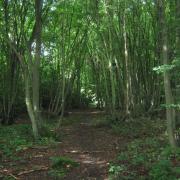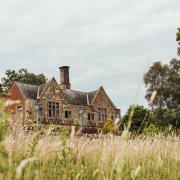We all know the positive affect having pets can have on us – just stroking a dog or cat’s fur has been shown to lower human blood pressure – but how can animals help people with very specific needs? We find out from some of those working with amazing creatures throughout the county.

Amelia Price and Scamp
‘Scamp has changed my life – he’s my best friend and my rock,’ says 18-year-old Amelia Price from Bromley. It was her mum, Joanne, who first heard about the Hearing Dogs for Deaf People scheme that she thought could help Amelia, then aged 11. Explains Joanne, ‘Amelia was lacking in confidence, was getting bullied at school and was really anxious – she’d say things like, ‘what if someone breaks into the house and I can’t hear them?’ Joanne put Amelia’s name down on the register, but it takes extensive training, resources and time to produce a Hearing Dog for Deaf People, and Scamp, an orange Roan show cocker spaniel, didn’t come into their lives until she was 13. ‘It seemed like a long wait,’ says Amelia, ‘But when we learned all that it took to train him, we understood.
It costs £40,000 to fully train and support a hearing dog for the duration of its life, and the charity relies entirely on the support of donations. First, Scamp was with volunteer puppy-trainers, then he headed to The Grange in Buckinghamshire, the Hearing Dogs for Deaf People HQ, for final training there. ‘It was staff members Bekah and Darcy who trained me to work with Scamp, and who taught me how to take care of him,’ says Amelia. ‘We’re all still in regular contact – we’ll head up to The Grange at least once a year to catch up with the team and they’re always happy to see how well we’re both doing.’
Highly trained Scamp alerts Amelia to all sorts of situations, waking her up first thing in the morning, alerting her to sounds from microwaves to doorbells, all while nudging her on the arm. Their mutual training means Amelia knows if there’s anything she needs to be really concerned about, for instance, Scamp’s urgent and sudden lying down on the floor means ‘danger’.’ To ensure both of them keep on top of these signals, Amelia spends 20 minutes every day going through sound-training with him, as well as brushing him and cleaning his teeth. ‘He’s so cheeky and loveable it’s easy to forget he’s a working dog, but he’s got a job to do and it’s very important that we both stay on top of it.’
For this reason, when Amelia was at school, Scamp would only accompany her once a year, when she gave assemblies at school explaining the work of Hearing Dogs for Deaf People. At other times, he wasn’t allowed to come in with her: ‘he’d just get played with too much and that’s not good for him when he needs to be working.’
The pair will be spending more time together, however, when Amelia – who has finished school with a Btec level 3 in Health & Social Care and Children’s Play, volunteers with the Girl Guides and is on the verge of attaining her Duke of Edinburgh Award scheme Gold badge - starts studying Early Years childcare at North Kent College's Tonbridge campus. It means Scamp has moved from being in an official Child Partnership to an Adult Partnership. ‘We’ll be doing far more things independently – getting the train together, visiting cafes and shops and sitting through classes at college - but again I’ll need to tell people quite firmly not to pet him all the time. We’re both really excited about this new phase.’
And when Scamp fancies a treat from his adoring owner, it’s not a dog biscuit Amelia reaches for, but a carrot. ‘He loves them! We saw lots of the dogs being given them as treats at The Grange, so it’s obviously a thing there – he must like to stay healthy!’
hearingdogs.org.uk

Jemeela Savage and her alpacas
Back when she was working for the NHS, clinical psychologist Jemeela Savage probably never imagined she’d end up working with alpacas as a means of helping young people through difficult times. ‘I had a ‘walking with alpacas’ experience myself a few years ago, told my husband I was amazed how grounded and calm they’d made me feel, and remarked, ‘Everyone needs an alpaca’ . He was looking to start a new career after redundancy, took me at my word, and in 2019, we welcomed our first five animals here in Cuxton.’
Animal-Assisted Therapy sessions for young people at Lower Bush Alpacas grew out of the wellbeing sessions that the couple still offer ‘Mindfulness and a sense of being at one with nature are great tools for good mental health,’ says Jemeela, ‘But it was clear that there was a much greater need I could help meet in a professional capacity.’ Now, having left the NHS in 2021 to work round the couple’s two young children and to concentrate, too, on the alpaca business, once a week Jemeela works one-on-one with young people with specific psychological needs. First, she will assess her client, together they will determine specific goals – a reduction in anxiety for instance – and then they’ll work with the alpacas, using them as a catalyst to explore issues and devise coping strategies ‘I have a duty of care towards my clients and my animals, so I make it very clear that this isn’t just about spending time with the alpacas – we may be doing different activities, including writing and drawing to work towards the young person’s goals – but the animals provide a context for that and can help in many ways. Many people with autism, for instance, find connecting with animals far easier than they do connecting with people and certainly it’s easier to ‘read’ the signs an alpaca will give you – if they’re not happy, they’ll move away.’
As far as the alpacas are concerned, it’s the most predictable and steady that work most effectively with her clients, Jemeela says. ‘It’s only me, the animal and the client when we’re working, so I need to know nine times out of ten how the animal will respond – Burdock, for instance, is one of my alpacas who I can always count on for that. And where alpacas differ from, say, dogs is that they’re herd animals – they act as a social group, so there are lots of springboards for discussion about family dynamics based on how the animals may be behaving – whether that’s affection or rivalry. ‘I’ll normally have six to 12 sessions with a client, and it’s incredibly rewarding to see them become visibly calmer during their time with the animals – with their parents reporting it’s a calmness that lasts. And having seen for themselves that certain approaches are effective in building relationships with the alpacas, they are then able to apply – albeit subconsciously – the same sort of techniques and what they’ve learned in their relationships with other people.’
lowerbushalpacas.co.uk

Julie Hardy: horses, chickens, wildlife and more...
Former residential social worker Julie set up Chalkhill, the care farm in Canterbury that she runs with her ex-policeman husband Karl, back in 2007, ‘Having grown up with access to land and animals myself – my mum once caught me trying to ride a sheep when I was little – I wanted to share my own knowledge and love of the countryside with others. We started off hosting children’s birthday parties, but it rapidly became clear that there was a real need from children with mental health issues, especially those who’ve experienced trauma.’
Although some access Chalkhill privately, Julie says many children are referred to them via local authorities and their schools: ‘we tend to work with those who couldn’t be helped via any other methods.’
The farm is home to animals from goats to horses, and equine therapy, says Julie, can be particularly effective for children with trust issues: ‘We have race horses and rescue horses here and they can be very sensitive, so it’s almost a form of mutual therapy. It’s brilliant to see young people who’ve had problems forging relationships with humans able to forge strong bonds with the animals.’
Interactions with horses can provide useful ‘cues’ as to how to interact on a person-to-person level.
‘If a child wants a relationship with a horse, they need to approach it gently; look it in the eye and march up to it and it’ll be scared off,’ says Julie. ‘The same goes for humans, too – which is why equine therapy is so useful in helping build relationship skills.’
It's not just horses that can help young people handles issues, however. ‘From insects to chickens, nature can gently allow children to revisit so many issues – including some that may issues that may have been traumatic for them in the past, including death and loss. It’s about realising there’s a natural life cycle and using time spend outdoors as a way of building up mental and physical resilience.’
Julie says that many of those that she and the team at Chalkhill see go on to work with animals themselves, such are the benefits they’ve experienced. ‘It’s incredibly rewarding to see what they achieve. We had one student who came to us unable to walk or move because she was so traumatised. After a course of sessions with us, she’s actually been able to head off to college – just wonderful.’
chalkhillfarm.co.uk












![The torchlit Wassail procession makes its way to the New Ash Green Community orchard [Photo courtesy of New Ash Green Woodlands Group]](/resources/images/128x89/1x/17558355.jpg)
![The torchlit Wassail procession makes its way to the New Ash Green Community orchard [Photo courtesy of New Ash Green Woodlands Group]](/resources/images/180x180/1x/17558355.jpg)














